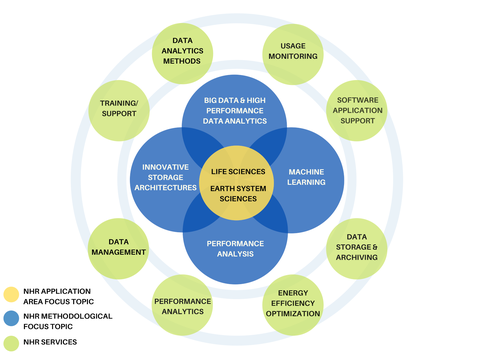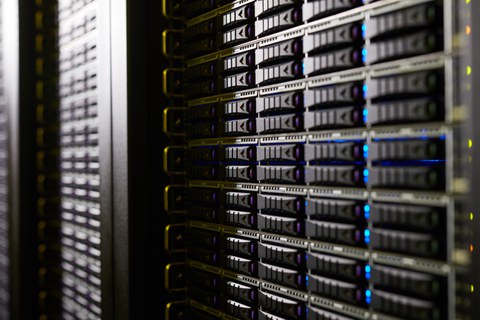NHR Center
National High Performance Computing - NHR
Since 2021, HPC at universities has been restructured by the NHR network. The network consists of nine centers, which operate the systems and offer a coordinated consulting service on the methodological competence of scientific HPC. The aim is to provide scientists at German universities with computing capacity for their research and to strengthen their skills in the efficient use of this resource.
The funding concept provides for the federal and state governments to jointly finance investment costs as well as operating and personnel costs. To this end, the federal and state governments will jointly provide a total of up to 62.5 million euros annually over a period of ten years in each case. (Press release of the Joint Science Conference, GWK)
NHR@TUD: NHR priorities of the ZIH
In the application area, our main focus is on:
- life sciences and
- earth system science.
Support is provided here for classical HPC tasks (parallel simulations and coupled codes), as well as for particularly data-intensive HPC tasks, and for data analysis using Big Data and AI methods.
Our methodological focus is on:
- Methods for Big Data and data analysis as well as management,
- Machine Learning
- Tiered storage architectures and I/O optimization
- Performance and energy efficiency analysis and optimization.
Here you find our NHR courses: NHR training
ZIHs concept "HPC Data Analytics
Current challenges for scalable computing systems often come from Data Analytics and Big Data application fields. That's why innovative computing architectures should consequently complement classical HPC with a data-oriented approach. The ZIH approach as an NHR center with focus on data-driven HPC and high-performance data analytics, is therefore based on the concept "HPC Data Analytics II".
Our system architecture with a further developed, tightly networked island concept is especially designed for the application requirements for CPU, GPU, I/O and large main memories. Due to ZIH's responsibility in the AI and Big Data competence center ScaDS.AI Dresden/Leipzig, the task of adapting tailored memory and computational concepts to HPC architectures for method development in these areas arises.
Partners
Five co-PIs complement this expertise with their specific methodological approaches and application-specific excellence:
- Prof. Ezio Bonifacio (Center for Regenerative Therapies, TU Dresden)
- Dr. Michael Bussmann (Center for Advanced Systems Understanding, Helmholtz-Zentrum Dresden – Rossendorf)
- Prof. Wolfgang Lehner (Database Technology Research Group, TU Dresden)
- Prof. Erhard Rahm (Database Group, Universität Leipzig)
- Prof. Ivo F. Sbalzarini (Center for Systems Biology, MPI-CBG und TU Dresden).
Futher Information
- NHR: https://www.nhr-verein.de/kontakt-geschaeftsstelle
- Press release on the foundation of the NHR association: https://www.gwk-bonn.de/fileadmin/Redaktion/Dokumente/Pressemitteilungen/pm2021_08.pdf
- Press release for ZIH beeing NHR center:
https://tu-dresden.de/zih/news/nhr-am-zih-der-tud - Press release of the Joint Science Conference, GWK


